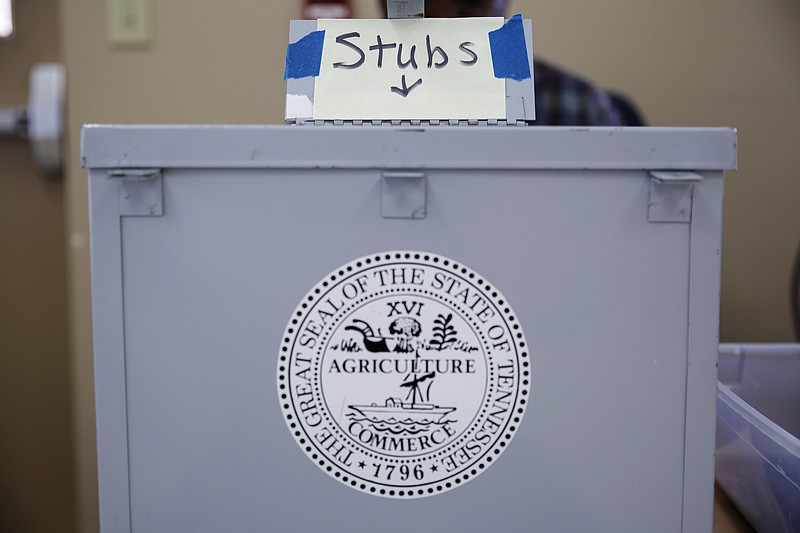Let's say you're a District 7 voter in Hamilton County who typically casts a ballot for Democrats. You have all of one contested race in which to vote - county mayor - in the May 1 primary, but you know and like one of the Republican Circuit Court judge or register of deeds candidates. Could you, loyal Democrat, legally go to your voting place and request a ballot to vote in the Republican primary?
Yes, you could. And, of course, the same applies to a Republican voter who wants to vote in the Democratic primary.
Technically, though, according to a post on a legal blog dedicated to covering the Supreme Court of Tennessee, we are a closed primary state, which means only voters expressly affiliated with a particular party may vote in that specific party's primary election.
Tennessee law spells it out: "A registered voter is entitled to vote in a primary election if: 1) The voter is a bona fide member of and affiliated with the political party in whose primary the voter seeks to vote; or 2) At the time the voter seeks to vote, the voter declares allegiance in whose primary the voter seeks to vote and states that the voter intends to affiliate with that party."
That sounds to us like party registration is mandatory or that there could be a whole lot of "declaring" and "stating" going on at polling places.
But we've never seen any of the latter, though it might be interesting to observe.
No, according to the aforementioned blog poster, Daniel Horwitz, "the party affiliation requirement exists only in theory." State law, he says, does not mandate any party registration, so it does not impose any party registration requirement on voters.
Only political parties, as private organizations, he posits, have a First Amendment right to determine criteria for their membership and to include or exclude whosoever they would.
So, Horwitz writes, it is possible for a crossover voter to be challenged, but the process is complicated and, as he terms it, "practically useless."
According to Tennessee law, a crossover voter would have to be recognized by a party challenger before casting a vote, would have to be challenged on the spot and would have to have that challenge adjudicated unanimously by three previously appointed party judges.
"For obvious reasons, however - namely, that it is impossible and economically infeasible to carry out party purity challenges across the state in primary elections during which several hundred thousand (or more) votes are often cast - this process simply does not occur in nature," Horwitz says.
While we believe open primaries offer the fairest and best opportunity for voters in what is our two-party system today, only 16 states have fully open presidential primaries, and only 19 states have fully open congressional and state primaries, according to openprimaries.org.
U.S. Sen. Bernie Sanders, I-Vt., claimed closed primaries, among other things, denied him the 2016 Democratic nomination for president. Experts have said while closed primaries may have hurt him, they probably didn't deny him the nomination, based on the vote total advantages rung up in some states by eventual nominee Hillary Clinton.
Nevertheless, The Sanders Institute, founded by the senator's wife, Jane O'Meara Sanders, has made one of its goals to end the disenfranchisement of unaffiliated primary voters.
Such voters, says former Ohio state Sen. Nina Turner, a Sanders Institute fellow, are "uncounted, unheard and unrepresented."
She doesn't specifically endorse open primaries but says the country's mix of open, closed, partially open and partially closed primaries constitute an "unfair" and "complicated" system.
"It's no secret how bad [the parties] can mess things up," Turner says on a video on the organization's site. "The rules can be maddening," and "some states reserve the right to change the rules whenever they want."
We're not likely to agree with much an organization that says it is in the "pursuit of progressive solutions to economic, environmental, racial and social justice issues" recommends, but it's not hard to figure that the various primary systems can wind up hurting Democrats one year and Republicans the next.
Typically in Tennessee, if our experience is like others, primary election workers ask voters if they prefer to vote in the Republican or Democratic primary. On a recent visit to the Hamilton County Election Commission, that's what we heard. And then, without being asked the same question, we were handed a ballot for a specific party. To be fair, the clerk had just effected a name alignment for us, so she may have noticed our primary preference had been the same for several years. But we're sure, even if we had requested a ballot for the other party, it would have been handed to us without us having to prove any bona fides or do any declaring.
Despite the Volunteer State's somewhat confusing law, every voter can vote. We believe that's the way it ought to be.
